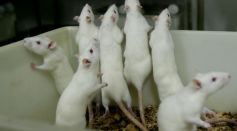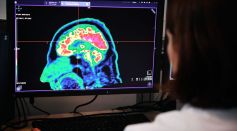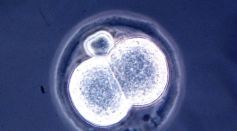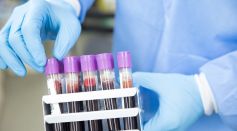Tags: Cancer

Study in Mice, Ferrets, and Monkeys Reveal the Virus That May Be Causing Multiple Sclerosis; How Effective is Vaccine as Protection?

Samuel Waxman Cancer Research Foundation Announces 9th Annual Collaborating for a Cure 2022 Ladies Luncheon and Auction

Johns Hopkins Graduate Students Invent a Medical Device That Could Spare Thousands of Cancer Patients Each Year

AI Predicts Early Pancreatic Cancer Development Using CT Scans for Abdominal Pain

Mediterranean Diet Reduces Risk of Preeclampsia During Pregnancy, Prevents Diabetes and Cancer

Over 100 High School Students in the Same New Jersey School Have Brain Tumor in the Last 30 Years, Nobody Knows Why

Histotripsy: Non-Invasive Liver Cancer Treatment by Sound Waves Developed

Is Eating 2 Bananas a Day Bad for You?

Yale Scientists Uncovers Protein Closely Linked to Cancer as Key Regulator of Body Weight

Lung Cancer Patients Found More Effectively Responding to Immunotherapy; New Gene Linked to Autoimmune Disease Detected

Helium-3 Leak from the Core of Earth Discovered, Stimulating Doubt Among Astronomers About Planet’s Formation

Cancer Relapse Can be Predicted More Effectively Through White Blood Cell Motion Shown in 10-Second Videos

Marshmallow-Like Immunotherapy Factory Fends off Cancer; Says Recent Study

Cells Have Octopus-Like Tentacles Helping Them Move Around and Inhibiting Them Could Probably Stop Cancer From Spreading, Study Claims

Lung Cancer Diagnosis: Researchers Develop Device Using Tiny Worms That Will Someday Help Detect the Deadly Disease

Diagnostic, Treatment Strategy for Cancers Study How Stabilizing Chromosomes Help in Dealing with Tumors

Persistent Lung Cancer: Personalized Blood Test Could Detect Tumor to Select Best Treatment Options

Ants May Soon Help Hospitals with Early Detection of Cancer in Humans, New Study Reveals

Colorectal Cancer Appears More in Taller People, Study Suggests

Drinking An Average Cup of This Tea Triples the Risk of Cancer, Equivalent to Smoking 100 Cigarettes
Most Popular

Will Earth's Magnetic Poles Flip Next? Magnetic Pole Reversal Explained Through Cutting‑Edge Magnetosphere Science

Relativity Time Dilation Explained: The Physics of Time and Why It Moves Differently in Space

How Lightning Science Reveals Why Charged Storms Are Rising with Global Warming Effects

How AI Is Used in Weather Prediction: Smarter Forecasting Through Machine Learning





